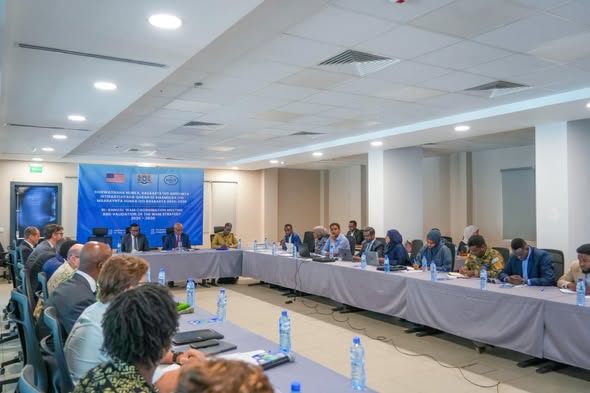National Security Office convenes Coordination Meeting on Somalia’s National Arms and Ammunition Management Strategy 2025–2030

The Office of the National Security Advisor today hosted a high level Coordination Meeting on Arms and Ammunition Management in Mogadishu, an event that takes place twice a year and serves as a vital platform for advancing Somalia’s national and international commitments to responsible arms control. The meeting placed special focus on the endorsement of the new National Strategy for Arms and Ammunition Management (2025–2030), a comprehensive framework designed to strengthen national oversight, improve accountability, and enhance security sector reforms across the country.
The meeting was chaired by the National Security Advisor to the President, Ambassador Aweys Haji Yusuf, who emphasized the importance of an integrated national approach to managing weapons and ammunition as a cornerstone of Somalia’s stabilization and security agenda. He commended the progress made by national institutions and international partners in advancing Somalia’s compliance with global arms control standards, noting that the new strategy aligns with Somalia’s broader goals of sustainable peace, effective security governance, and institutional capacity building.
Senior officials attending the meeting included the Director General of the Ministry of Defense, representatives from the Ministries of Internal Security and Justice, and high ranking officers from key national security agencies such as the Somali Police Force, the National Intelligence and Security Agency (NISA), the Custodial Corps, and the Somali National Army (SNA). These institutions play critical roles in the implementation, monitoring, and enforcement of arms management regulations at both the federal and regional levels.
The session also brought together representatives from the United Nations, partner embassies, and international organizations that support Somalia’s efforts to strengthen arms and ammunition management, enhance transparency, and prevent the illicit proliferation of weapons. International partners reaffirmed their commitment to continuing technical assistance and capacity development programs aimed at improving Somalia’s regulatory framework, storage systems, record keeping, and tracing mechanisms in accordance with international best practices.
Participants reviewed the achievements of previous coordination meetings, including improvements in national arms registration systems, the establishment of secure storage facilities, and the adoption of new procedures to ensure that weapons are properly marked, documented, and monitored. Discussions also covered the challenges that remain, such as the need for sustained funding, stronger inter agency coordination, and continuous training for security personnel tasked with handling and managing arms and ammunition.
At the conclusion of the meeting, participants reached a unanimous agreement to finalize and operationalize the National Arms and Ammunition Management Strategy (2025–2030). The strategy outlines key priorities, including strengthening legal and institutional frameworks, enhancing accountability and transparency in arms control, and supporting ongoing efforts to combat the illicit flow of weapons.
It was agreed that the Ministry of Defense will formally submit the National Strategy to the Council of Ministers for approval, paving the way for its official adoption and implementation. Once endorsed, the strategy will guide national efforts toward a safer, more secure, and well regulated defense and security sector, an essential milestone in Somalia’s journey toward lasting peace, stability, and responsible governance.
END
